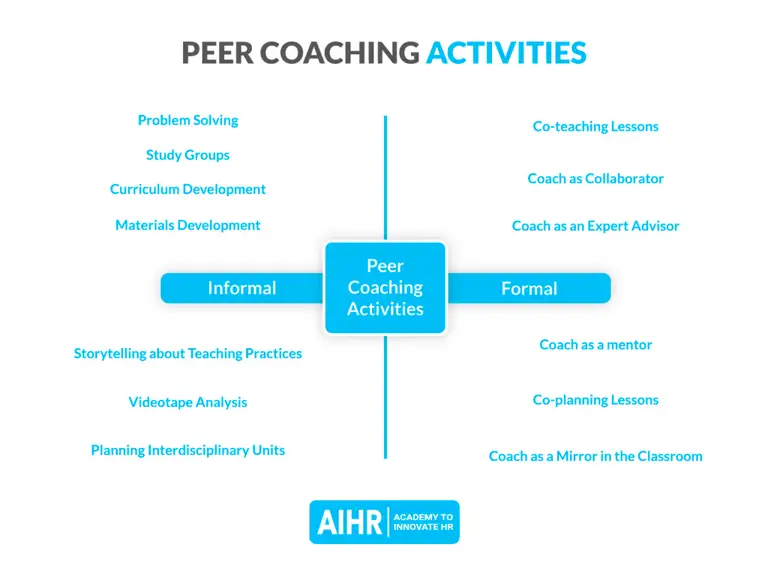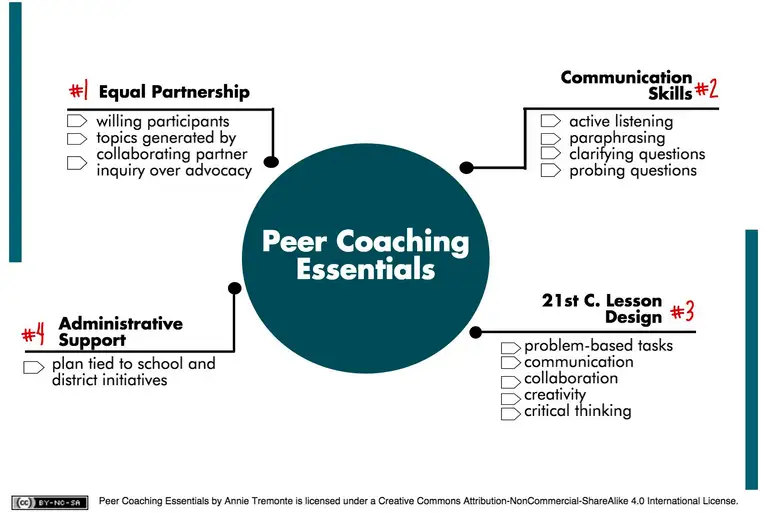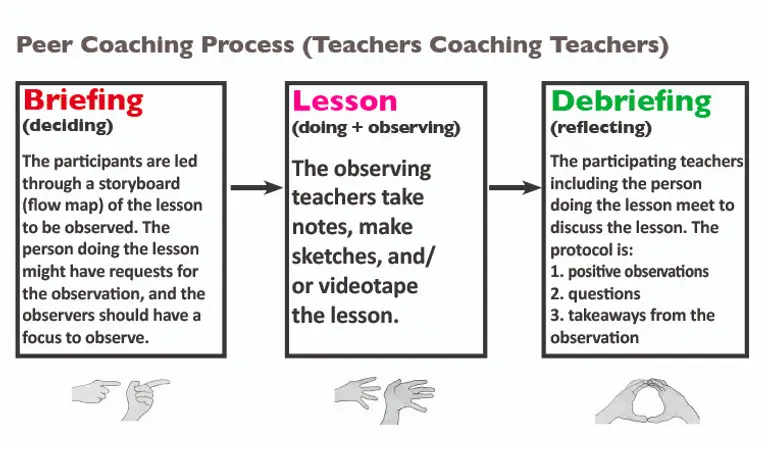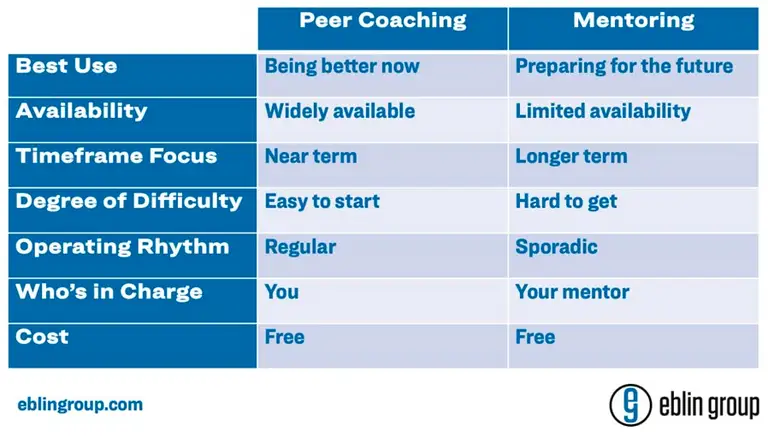If you’ve ever wanted to make your employees grow, you’ve probably looked at countless programs, courses, and groups. But why not look within first?
Peer coaching is an incredible method for empowering a business from within, boosting employee engagement, and growing your employees’ coaching skills, all the while increasing your profits.
Today, we’ll show you all you need to know about peer coaching programs: what they are, the pros and cons and the best ways to get started.
What is Peer Coaching?
Peer coaching is a form of mentorship in which a more experienced person assists a less experienced one. Peer coaching programs are training types that help professionals and other leaders become more effective and successful in their careers.

Peer coaching is based on the idea that mentors help people learn and grow and that they can do this by providing support, guidance, and accurate feedback. The mentor helps the mentee develop and improve their skills, knowledge, and abilities.
The difference between executive coaching and peer coaching is not just the audience and the goal. There is also the psychological safety that employees feel since they’re in a professional development program run by people they know.
The peer coach is usually someone who is experienced in the area that the mentee is trying to learn. This person can provide a wealth of knowledge and advice that can help the mentee develop the required skills and knowledge.
At the same time, the person who is being coached needs to provide feedback to their mentor, creating an effective and direct feedback loop.
The benefits of peer coaching
If you’re looking to get more employees into leadership development or just teach them new skills, you’ll want to know the many substantial benefits of peer coaching before getting started.

Developing new skills
By working with a peer coach, you can learn how to better communicate with others, how to set and achieve goals, and how to manage your time and resources. In addition, peer coaching can help you build your confidence and leadership skills. So, the peer coaching experience can provide you with a mix of hard and soft skills. This is one of the main benefits of coaching that is easy to sell to your management if you’re looking for buy-in.
Getting unstuck
If you feel like you're stuck in a rut, peer coaching can be a great way to help you get unstuck. By talking to someone who is impartial and who can offer helpful and effective feedback, you can gain a new perspective on your situation. This can help you to see things in a new light, avoid blind spots and to come up with new solutions to your problems. The power of peer coaching is the ability to view old problems with a fresh point of view and give new coaching ideas.
Working through difficult problems
When you talk through your problems with someone who is in a similar situation, you can gain perspective and come up with new solutions. Additionally, peer coaching can help build your confidence by providing you with peer feedback and support.

Learning from others
Working with a peer coach allows you to gain valuable insights into the way that other people think and learn. This can be a great way to improve your own skills and knowledge. In addition, peer coaching can also help you build strong relationships with other people through actionable feedback sessions. This can be a great way to support each other in your journey to success.
Building relationships
Building relationships with other people can be beneficial in many ways, including helping you to develop a better understanding of yourself and others, and helping you to build a network of supportive relationships.

Examples of Peer Coaching in the Workplace
A peer coaching relationship in the workplace can do wonders for everyone involved. However, getting started with the employee coaching process can be difficult if you have no idea what it even looks like. Here are some practical examples from the workplace.
- One example of how peer coaching can be used in the workplace is to help employees improve their communication skills and peer relationships. Employees can benefit from a peer coaching model and improve their ability to communicate effectively with their coworkers. This can foster better communication between departments, as well as the overall company communication.
- This type of coaching can help employees learn how to better manage their emotions in the workplace. The same holds for your primary team in the office and your hybrid and remote employees.
- Peer coaching can be used to help employees improve their skills in their roles. For example, an employee may need help learning how to better manage their time or how to better organize their work. Peer coaching can help employees learn these skills and more. Whatever the form of learning, peers can provide helpful resources to get ahead.

Ten Peer Coaching Activities
Here are 10 peer coaching activities that you can use to improve your own productivity and skills:
1. Share your successes and challenges with a peer.
One of the best things you can do for your career is to find a mentor or peer coach to help you along the way. A peer coach is someone who can offer you advice and support as you navigate your career. This creates a better organizational culture as you’re starting and leading with an example.
Peer to peer coaching in the workplace can help you identify your goals and challenges, and offer advice on how to overcome them. Sharing your successes and challenges with a peer coach can help you stay motivated and on track and you’ll find new peer coaching candidates who can join you in the future.
2. Offer constructive feedback to a peer.
It is important to avoid giving feedback that is vague, subjective, or not actionable, as this can lead to misunderstandings and frustration. When giving feedback, always aim to be clear, concise, and helpful. And if you’re the one getting peer feedback, practice active listening and soak in the feedback you’re getting instead of waiting for your turn to speak.
The same rules apply for one-on-one coaching and small-group coaching.
3. Foster a supportive environment for a peer.
Create an atmosphere where people feel comfortable sharing their thoughts and ideas, and feel supported in their efforts to improve their skills and knowledge. By creating a supportive environment, peer coaches can help their colleagues feel more confident and motivated to achieve their goals. Your aim is not to create a formal program where an executive coach leads the show. Instead, create a natural environment for people where everyone feels comfortable being themselves.
4. Encourage a peer to take risks.
It can be easy to get bogged down in the day-to-day grind and forget to take risks, but it's important to push ourselves to try new things and stretch our comfort levels. When you see a peer considering a new opportunity, challenge, or project, let them know that you think they can handle it and that you're rooting for them.
Taking risks is how we grow, learn, and become better versions of ourselves, and it's always worth it to have someone in our corner cheering us on. Make it a part of your peer program action plans to foster an organizational culture where employees can risk and fail. Do hold people accountable, but give them opportunities for learning too.
5. Teach a peer new skills.
Peer recognition provides an opportunity for employees to share their skills and knowledge with others. This can be a great way to help a peer learn new skills and improve their performance at work. This can be anything, from practical, hard skills to soft skills such as empathy. That’s the true power of peer coaching - you’re not limited in what you can learn.
6. Help a peer overcome obstacles.
Become a sounding board for them. If they are feeling overwhelmed, help them break their goals down into smaller, more manageable steps. Encourage them to keep moving forward and offer your support along the way so that they remember the peer coaching experience in good light.
7. Offer support when a peer needs it.
In the workplace, peer support can be a valuable way to build team morale and foster a sense of community. By offering support to others, we can create a more positive and supportive work environment for everyone. Coaching from managers helps a good bit here.
8. Advocate for a peer.
When you advocate for a peer, you are essentially acting as their champion. You are speaking up for them, whether it is to give them a positive review or to defend them against negative feedback during your coaching sessions and leadership development programs.
Advocating for a peer is a way to show that you trust and respect them and that you are willing to stand up for them. This is an important activity in the workplace and in the coaching culture because it builds trust and camaraderie among employees.
9. Offer moral support.
This involves offering support and encouragement to employees who may be struggling with work-related issues. By offering moral support during peer coaching sessions, peer coaches can help employees feel supported and valued in the workplace, and this can ultimately lead to improved morale and productivity.
10. Celebrate successes with a peer.
Peer coaching provides an opportunity to celebrate successes with someone who understands the challenges and hard work that went into achieving them. It's a chance to share the triumphs and lessons learned with someone who can appreciate them, and who can offer their own insights and advice throughout the peer coaching process.
What's more, it's a chance to build a stronger bond with a colleague and to deepen the trust and respect between you two. So next time you have a small or tremendous success to celebrate, be sure to reach out to a peer coach and share the good news! Make this a part of your team development plan and it will eventually become a part of your workplace culture too.
Wrapping up
Running a successful peer coaching program doesn’t take lots of effort, time or money. Once you find out what your employees excel at and what they’re willing to share with others, peer coaching opportunities will show up by themselves.
And if you’re willing to give some extra help to your peer coaching participants, use Unrubble and track their time! You’ll learn how much time you’re spending on your coaching program so you can fine-tune it and make it not efficient in all aspects.
Frequently asked questions
What is the role of a peer coach? A peer coach should help you learn a new set of skills, be it hard or soft skills. These should be practical skills to help you in the workplace, but also holistic employee development skills that can help you further your career. They help employees develop a growth mindset that goes beyond the primary activities in their day-to-day work.
What is the difference between mentoring and coaching? The difference is the direction. Both mentors and coaches help people with skill development. However, mentors do more of the talking and guide the person to a solution for a problem. Professional coaches (and peer coaches) do more listening and guide people to fulfilling their potential.
What are the skills of a good peer coach? Good peer coaches are devoted to bringing out the best in others through peer learning. They are humble and self-aware - of what they know and don’t know. They are committed to reaching great results so that everyone gets the maximum benefit from a peer coaching program. They not only have the hard skills to enable professional growth in their peers, but they also have the soft skills and the emotional intelligence to lead and teach.



![What Does PEO Stand For In HR Administration? [2026 Guide]](/static/image?src=https%3A%2F%2Fcdnblog.unrubble.com%2Fpayload-unrubble-images%2FUnrubble-what-does-peo-stand-for-in-hr-administration-180x120.jpg&width=128&height=128&fit=cover&position=center&quality=65&compressionLevel=9&loop=0&delay=100&crop=null&contentType=image%2Fwebp)



